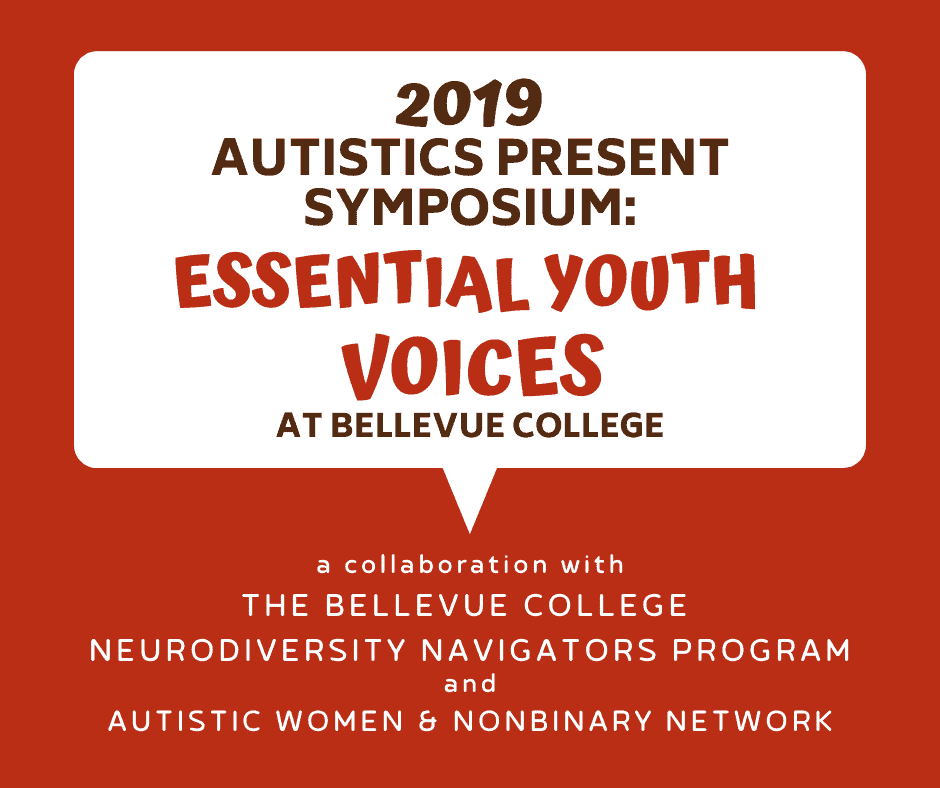
Autistics Present Symposium: Essential Youth Voices
Students, educators, parents, professionals, autistic self advocates and disability activists were in attendance at the Autistics Present Symposium: Essential Youth Voices at Bellevue College on Saturday, October 19th, 2019. Now in its fourth year, this annual event is a collaboration between the Neurodiversity Navigators program (formerly Autism Spectrum Navigators) at Bellevue College and the Autistic Women & Nonbinary Network. This year’s event featured talks and presentations from autistic youth ages 13-22 on a wide variety of topics.
For the first time, attendees did not have to choose which workshops or sessions to attend as a new format was adopted that allowed participants to listen to every speaker. Mistress of Ceremonies Abigail Leaver welcomed guests and introduced each speaker, provided image descriptions and did an outstanding job to help the event run smoothly.
Harrison Scott’s “The Right To Be Autistic: Forging My Own Path” highlighted the importance of supporting autistic people to follow their passions and interests. He used examples from his own life to illustrate how this not only helped him to learn valuable career related skills, but ultimately helped him to forge a strong sense of pride in his autisitc identity and community.
Yana Ramos followed up with a talk on alexithymia entitled “ #AllTheFeels: Alexithymia, Interoception and the Autistic Experience”. Guests learned about the prevalence of alexithymia not just in the autistic population, but in the general population as well. Yana gave helpful tips to support those who experience alexithymia while challenging stigma and the pathology paradigm.
“Neurodiversity for All: How Parents & Professionals Can and Must bring the Neurodiversity Movement into Schools & Services” from presenter Ryan Ricker touched on the importance of moving away from the medical model of disability in supporting and empowering autistic students. Ryan emphasized how behavioral approaches and “interventions” actually do more harm than many non-autistic parents and professionals realize.
Magical Narwhal and Pink Fox Wright showed a video presentation on how doctors and other medical professionals can create a more welcoming and accessible environment for autistic patients. Their video, entitled “Doctors Make Me Sick!” featured their own original artwork to illustrate different scenarios they have encountered as patients and how doctors can do a better job supporting the autistic community.
Ben and Hannah Zerba recounted their own experience as multiply neurodivergent teens in “Break The Stigma: Spread The Truth”. Many autistic people have one or more co-occuring psychiatric diagnoses and this presentation helped attendees to understand how ableism and the various forms of mental health stigma harm us all and how to work towards acceptance and pride in each part of our identity.
In “Autism and the Alt Right: A Community Conversation”, Eric Warwick started her talk with land acknowledgment and how the history of colonialism and racism is still alive and relevant today. She broke down how ideas like aspie supremacy, ableism and misogyny make some autistic youth easy marks of alt right recruitment even as the movement also targets autistic people . Eric gave tips on recognizing these tactics and on de-radicalization strategies.
Quincy Hansen’s “Thinking with the Autistic Perspective” challenged the way the world talks about and interacts with autistic people from a neurotypical point of view. Quincy’s talk showed participants more effective ways to communicate with and support the autistic people in their lives by embracing a model of empathy and autism acceptance.
The closing keynote of the day was from F M on “Respecting Autistic Ways of Playing, Interacting & Making Friends”. F shared slides and a video presentation to explain how autistic people move, communicate and socialize in different ways than some might expect and why that is not just okay, but should be supported and celebrated. Using his own personal experience in making friends, finding autistic mentors and finding acceptance, he also spoke of the dangers of so-called “assigned friends” programs. He ended by giving advice to parents and professionals on authentic acceptance.
The fourth annual Autistics Present Symposium: Essential Youth Voices was a unique experience that provided a platform to center the voices of autistic youth, who are too often overlooked. Presenters shared their ideas and wisdom in a wide range of styles from video, art work, talking without slides, not talking at all, traditional slide shows and a mixture of different styles. To me, that really brought home the point that when autistic people are accommodated and supported in the way that works for them, they can do so much more than when forced to conform to only one way of being in the world. I learned a lot from many of these young presenters and am excited to see what else they will accomplish and teach us in the future.
